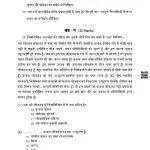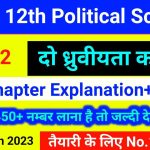Political science is the study of politics, government, and how societies are organized and governed. For BA 1st year students, these notes aim to make the subject simple and understandable. They will help you in exams, assignments, and understanding concepts.
Lecture Notes
Political science deals with various concepts such as state, sovereignty, law, rights, duties, and political ideologies. Here are the basics:
- State and Its Elements: The state is a political institution with four elements – population, territory, government, and sovereignty. A state cannot exist without these elements.
- Sovereignty: Sovereignty means supreme power. It is the authority of the state to govern itself without external interference.
- Law: Laws are rules established by the government to maintain order in society. They are binding on all citizens.
- Rights and Duties: Rights are privileges granted to individuals, like the right to freedom and education. Duties are responsibilities like obeying the law and paying taxes.
- Democracy and Other Forms of Government: Democracy is a government by the people, where citizens vote to elect their leaders. Other forms include monarchy, dictatorship, and oligarchy.
- Political Ideologies: Major ideologies include liberalism, socialism, communism, and feminism. Each ideology has its unique perspective on how societies should function.
Study Guides
- Always begin with the definitions and concepts. For example, know the definition of the state and its elements.
- Create summaries for every topic. Write down key points for quick revision.
- Use diagrams to represent ideas like the structure of the government or types of political ideologies.
Textbook Summaries
For BA 1st year, textbooks often cover:
- History of political thought (Plato, Aristotle, Machiavelli).
- Modern political theories (Hobbes, Locke, Rousseau).
- Indian political system and constitution.
- International relations and global politics.
Example summary:
- Aristotle’s view on the state: Aristotle believed the state is a natural institution. Humans are political animals, and the state helps them achieve their full potential.
- Indian Constitution: The Indian Constitution is the longest written constitution. It establishes India as a sovereign, socialist, secular, and democratic republic.
Flashcards
- Question: What are the four elements of a state? Answer: Population, territory, government, and sovereignty.
- Question: Who is the father of political science? Answer: Aristotle.
Class Handouts
Teachers may give handouts on topics like fundamental rights, duties, and the functioning of democracy. Keep these for revision.
Research Notes
While studying political science, you may need to research topics like globalization, human rights, or regional conflicts. Write down the key points and examples.
Annotated Readings
Highlight important sections in textbooks or readings. Write notes in the margins to explain ideas or relate them to real-world examples.
Homework Solutions
- Explain sovereignty with examples: Sovereignty is the supreme power of a state. For example, India’s government has full authority over its territory.
- What are fundamental rights? Fundamental rights are basic human rights provided by the constitution, such as the right to equality and freedom.
Exam Preparation Materials
- Review previous years’ question papers.
- Write short notes on key topics.
- Prepare essays on topics like democracy, political ideologies, or the role of the United Nations.
Lab Reports
In political science, you may not have traditional labs but may conduct surveys or case studies. For example:
- Survey Report: “Youth Participation in Democracy” – a study on how young people engage in politics.
Mind Maps
Create mind maps for topics like forms of government, political ideologies, and Indian Constitution. For example:
Forms of Government:
- Democracy
- Monarchy
- Dictatorship
- Oligarchy
Practice Quizzes
- Who wrote “The Republic”? a) Plato b) Aristotle c) Hobbes d) Rousseau Correct Answer: a) Plato
- What does socialism promote? a) Private ownership b) Equality and public welfare c) Military rule d) None of the above Correct Answer: b) Equality and public welfare
Sample Problems with Solutions
Problem: What is the difference between democracy and dictatorship? Solution: Democracy allows citizens to choose their leaders, while dictatorship involves rule by one person or a small group without public input.
Glossaries or Vocabulary Lists
- Sovereignty: Supreme power or authority.
- Constitution: A set of fundamental principles or laws that govern a country.
- Liberalism: A political ideology focusing on individual freedoms and equality.
- Secularism: The separation of religion from the state.
- Globalization: The process of increased interconnectedness among countries.






